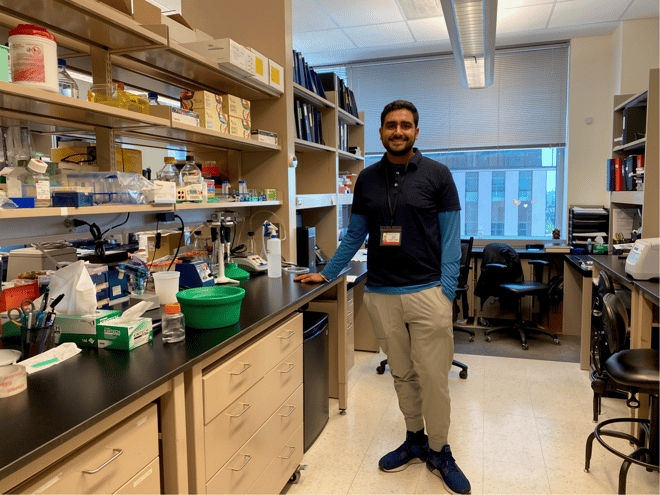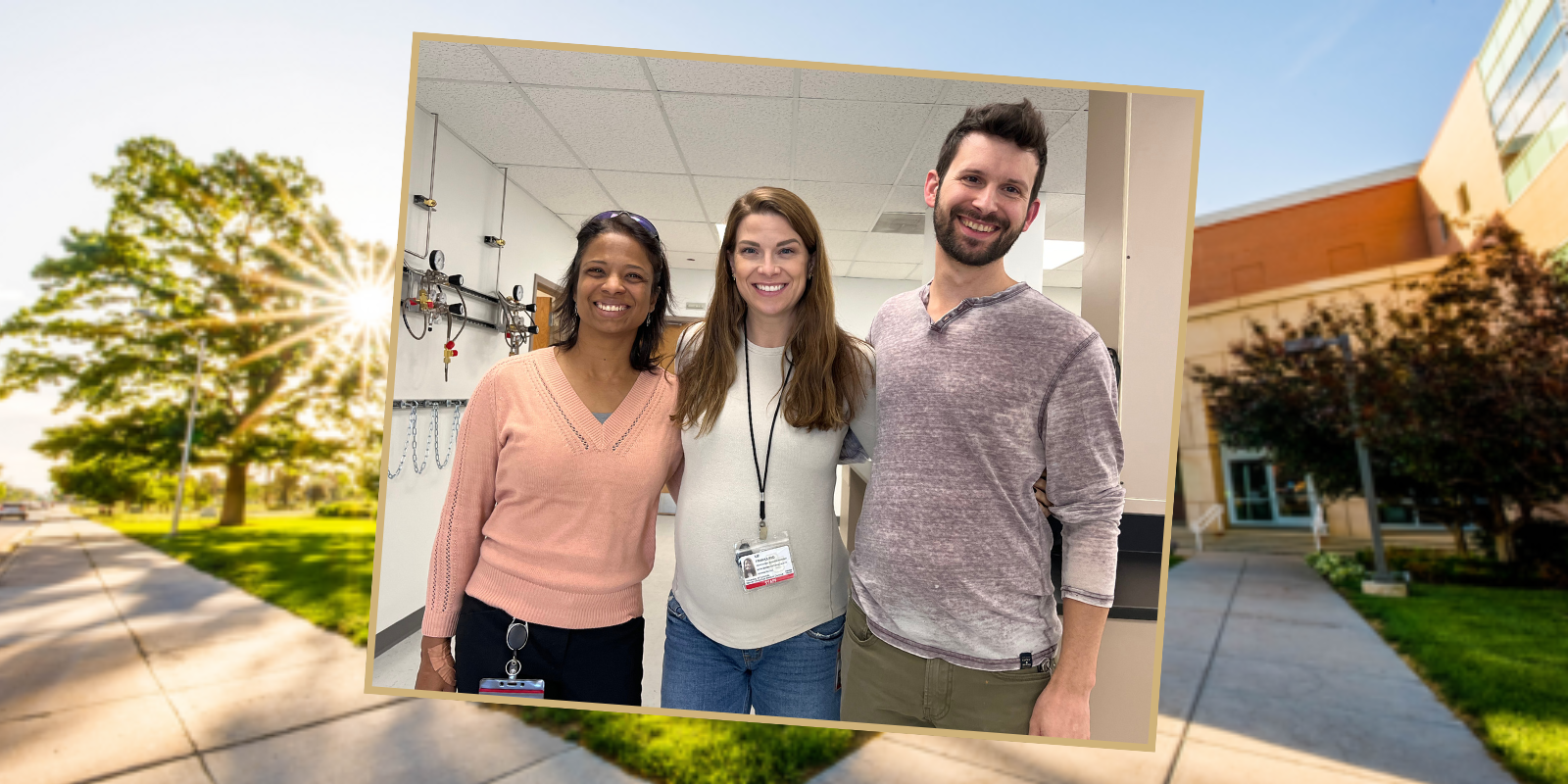Few college seniors can say they are working in a world-renowned lab to develop therapies for a genetic disorder that plagues 1 in 5,000 people worldwide.
But Jeevan Mann is not the typical college senior.
As an intern at the Gates Institute, he’s spending his summer working with Ganna Bilousova, PhD, and a team of researchers in the lab to develop novel therapeutics for Ehlers-Danlos Syndrome (EDS)—a disease he was diagnosed with as a teenager.
EDS is a group of disorders causing flexibility and elasticity problems in the body’s connective tissues. People with EDS experience a range of symptoms, from mild to severe, such as fragile skin, flexible joints causing pain and dislocation, and poor wound healing.
Researchers have identified 13 types of EDS. Twelve types have a known, specific genetic cause. The most common type, known as hypermobile EDS, impacts approximately 70% of these patients. Its genetic causes remain unknown.
Bilousova suspects hypermobile EDS is an umbrella term for patients who could not be “typed.” A large part of her team’s work surrounds identifying the gene or genes responsible.
She and her team are also working to develop specific therapies to help alleviate the life-altering and life-long symptoms of EDS.
A rare variant leads to a rare opportunity
A summer internship at a world class institute comes with prestige, yet Jeevan’s pathway to this work isn’t one most would wish for.
As a preteen, Jeevan was struck with a serious illness that baffled his doctors. After an incorrect diagnosis and symptoms that wouldn’t relent, doctors ordered an MRI to “check a box.” At age 12, Jeevan was diagnosed with a brain tumor.
The good news? His tumor was successfully treated. The bad news? Jeevan’s health continued to decline.
“I was an athlete all my life, and I could no longer participate. I had a photographic memory as a child, and I lost it for a couple of years. I couldn't even remember the names of the people around me,” he said.
Jeevan and his family consulted with doctors across the U.S. to determine a diagnosis of EDS. Inevitably, they determined he had a form of EDS characterized by a gene mutation present in only 14 people known worldwide.
“Being literally one of 14 people, it’s hard not to sometimes think ‘why me?’” Jeevan said.
He and his parents “stumbled” into cell and gene therapy due to the serious nature of his illness and lack of available treatments.
“Regenerative medicine gave us some hope of keeping my joints together,” he said.
After Jeevan’s diagnosis was confirmed, his family brought him to the Special Care Clinic at Children’s Hospital Colorado, one of the few institutions in the country with EDS specialists. The comprehensive center offers coordinated patient care and leads the development of future treatments through a collaboration of the Gates Institute, Children's Colorado, and the CU School of Medicine.
Jeevan’s clinical care team encouraged him to apply to be a summer intern at the EDS research lab, which is led by Dennis Roop, PhD, in partnership with co-director Bilousova and associate director, Igor Kogut, PhD.
'Growing' skin in the lab from EDS patient cells
Jeevan is a biological psychology major at the University of California, Davis. When applying for the internship, he was blown away by everything Bilousova and her team have accomplished with stem cells and genetics. He’s still in awe of being accepted to help with this work.
The experiment Jeevan is working on builds on the lab’s ability to “grow” skin in a dish. This “3D skin” enables researchers to take cells from EDS patients and grow samples for study.
In the non-EDS patient, the view from an electron microscope reveals an organized network of collagen. However, in skin developed from cells obtained from EDS patients, “the collagen network of EDS patients is all over the place,” Bilousova said.
Jeevan is helping the research team use the 3D EDS skins to find a more sophisticated therapy, using a relatively new field of study called exosomal therapy.
Exosomes are extracellular vesicles. They are secreted by most cells and are present in tissues and body fluids. They naturally help cells communicate. They can be used to transfer biological substances between cells which becomes a gateway for therapeutic intervention. Jeevan and his team are trying to harness the natural ability of human cells to produce vesicles, which can be enriched with factors that may help EDS patients.
“Our aim is to apply these vesicles to the 3D skins of EDS patients to see if there is any improvement in the collagen structure,” Bilousova said. “If we see some benefit to the organization of collagen, it will be a first step toward developing a more universal cell-free therapy for patients without knowing the specific mutations causing their disease.
Seeing a future without EDS
Because there is no cure for EDS or therapy designed specifically for its treatment, this work is personal for Jeevan.
“People like me with connective tissue disease go to the doctor and hear all the time how there’s no medication that can help beyond managing the symptoms. And even management is so different person-to-person, depending on what you’re able to tolerate. It’s a spectrum,” he said.
He’s amazed that he gets to work on this experiment.
“It’s allowing me to see that there’s hope for a future where we’re not encumbered by this disease. With every experiment we do, we’re one step closer to a life where people like me can reach their full potential.”

Gates summer intern Jeevan Mann finds special purpose in his work in the lab of Ganna Bilousova, PhD. "With every experiment we do, we’re one step closer to a life where people like me can reach their full potential." |
The challenging role of intern
Jeevan credits his overwhelmingly positive internship experience to the support of his supervisors, Parker Jesberg, Stefanos Koutsoukos, and Michael Ferreyros. He admits that at times, the experience was unnerving.
“When you’re surrounded by the most brilliant people you’ve ever met, somedays it feels like I’m following everyone like a lost puppy," he said. “But I’m learning. I make mistakes. I’m human. And I’ll get to their level, eventually.”
Bilousova reminds Jeevan that mistakes are normal.
“What’s important now is an intern’s enthusiasm, motivation, and willingness to learn. I really feel Jeevan has all of these qualities, and I’m sure this will make him successful wherever he may see himself in the future,” she said.
Jeevan plans to return to UC Davis this fall to complete his undergraduate degree and eventually pursue an MD/PhD, with the hope of helping other patients through personalized medicine and research.
Military Application of Research Leads to Department of Defense FundingBilousova’s lab began receiving funding from the Department of Defense’s Peer-Reviewed Medical Research Program (PRMRP) in 2022 to develop an exosomal therapy for EDS. This funding was possible thanks to the efforts of Dennis Roop, PhD, then-director of the Gates Center for Regenerative Medicine, who worked tirelessly with patient advocacy groups to include EDS into the PRMRP priority list. “Further research into this poorly understood and under-diagnosed disorder could also advance novel therapies or cures to treat conditions overwhelmingly affecting the military such as early-onset arthritis and mental health as well as thermal wounds,” said Roop in advocating for the funding. “We were pleased to see EDS added to the PRMRP list in fiscal 2022." |

-2.png)

%20for%20children%20and%20young%20adults%20with%20relapsed%20or%20refractory%20solid%20tumors.%E2%80%9D%20(1)-1.png)